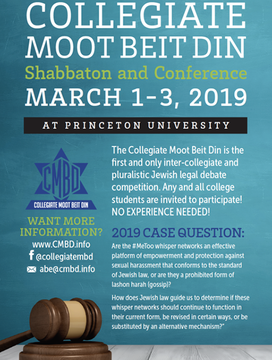Debating #MeToo and Torah in Lewis Library
In the wake of the #MeToo movement, quiet rumors among women claiming that certain men have committed harassment have protected women from retaliation, but some question whether this is fair to men who do not have a chance to respond to allegations.
But what would Leviticus say about these rumors?

This year’s case dealt with the ways that Jewish tradition and law might deal with “whisper networks,” informal chains of people who can share allegations of misconduct. In one prominent instance, a Google spreadsheet accusing men in the media industry of sexual misconduct went viral for a few hours in October 2017 before being taken down.
Students had to decide whether the whisper networks violated the Torah’s principle of lashon hara, which roughly translates to malicious gossip and is prohibited in most situations. The goal was not to debate whisper networks in general, but specifically their acceptability within the framework of Jewish law.
In this year’s fictional case, a nationally prominent rabbi had made a young synagogue employee uncomfortable. She learned that this was not the first time he had harassed someone, so she started a list to track allegations of misconduct in the Jewish community.
A distinguished group of judges decided which team in each of three divisions gave the best answer to the case. The judges included Yehuda Kurtzer, president of the Shalom Hartman Institute of North America; Marjorie Lehman, an associate professor at the Jewish Theological Seminary in New York; and Mira Wasserman, the director of the Center for Jewish Ethics at the Reconstructionist Rabbinical College.
“We have to have a very good reason for public humiliation,” argued Sarah Hirschfield, a Princeton junior who took part in the tournament. Even true rumors could violate Talmudic principles, she said, and the accuser had a responsibility to confront her harasser personally.
After Hirschfield’s team presented, a group from Rutgers argued that the standard rules only applied in situations where the accuser and the accused were of similar social standing and thus did not apply in this case, where the rabbi held more power. Instead, they said, the accuser should ask on the rabbi’s peers to talk with him privately and help him correct his behavior.
Rabbi Ira Dounn, the Reform rabbi at Princeton’s Center for Jewish Life, said the millenia-old laws that the students were interpreting can hold relevance for modern-day people even if they are not religiously observant Jews. “We have a rich Jewish heritage, and exposure to learning and texts is almost always a positive thing – because it’s learning!”
This was the second year that Princeton held the event. Abraham Waserstein ’21, who proposed the idea to Dounn last year, said the competition drew people from a wide range of Jewish backgrounds. He similarly sought gender and religious diversity among the judges, although they were all experts in Jewish law.
Participants attended a panel with the director of the Women’s Center and other Princeton offices that deal with issues of sexual misconduct two days before the competition. “I hope the conversation doesn’t end here,” Waserstein said. “It matters that we continue to have this conversation.”











No responses yet